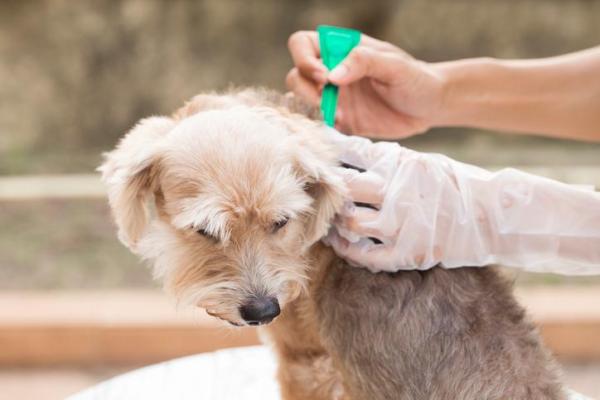Deworming My Pregnant Dog



See files for Dogs
Generally speaking, it is safe to deworm a pregnant dog. Deworming is a necessary protocol for any dog since it prevents common parasite infestations which can cause harm to both the dog themselves, as well as other animals and humans in the home. Protecting a pregnant dog from these problems also protects her fetuses as they gestate. There are some worries over the products used to deworm dogs. Generally speaking these products are safe and are not contraindicated in pregnant dogs. However, it is vital we speak to a veterinarian to outweigh the positives and negatives of deworming a pregnant dog. This is why AnimalWised asks can you deworm a pregnant dog?
Common parasites in dogs
There are several internal and external parasites that can affect dogs. Here are some of the most common:
- Fleas: external parasites that feed on the blood of dogs. They can cause itching, skin irritation, and in severe cases, anemia. Fleas can also transmit diseases.
- Ticks: another common external parasite that can attach themselves to a dog's skin and feed on their blood. They can transmit diseases such as Lyme disease, ehrlichiosis, and babesiosis.
- Roundworms: are types of intestinal parasites in canines that are commonly found in puppies. They can be transmitted to dogs through ingestion of contaminated soil, feces, or infected prey. Roundworm infestations can cause diarrhea, vomiting, weight loss, and a pot-bellied appearance.
- Hookworms: another type of intestinal parasite that can infect dogs. They attach to the intestinal wall and feed on blood. Hookworm larvae can penetrate a dog's skin, leading to skin lesions and inflammation. In severe cases, they can cause anemia.
- Whipworms: whipworms are intestinal parasites that primarily affect dogs. They live in the large intestine and can cause diarrhea, weight loss, and dehydration.
- Heartworms: are transmitted through the bite of infected mosquitoes. They can live in the heart, lungs, and blood vessels of infected dogs, causing severe damage to these organs. Heartworm disease can be life-threatening if left untreated.
- Ear mites: tiny parasites that infest a dog's ears, causing itching, irritation, and inflammation. They can lead to ear infections if not treated promptly.
It's important to regularly check your dog for parasites, keep their living environment clean, and use preventive measures such as flea and tick control products and regular deworming to protect them from these common parasites. If you suspect your dog has a parasite infestation, it's best to consult with a veterinarian for proper diagnosis and treatment.
Learn more about what to expect during canine pregnancy with our article on whether you can exercise a pregnant dog.
Can you deworm a pregnant dog?
Deworming a pregnant dog is a common practice and is generally considered safe when done under the guidance of a veterinarian. It's important to use deworming agents that are deemed safe for pregnant dogs and follow the appropriate dosage instructions.
The agents used to kill parasites in pets, including pregnant dogs, can have potential effects on the pregnancy. Here are some factors to consider:
- Medication safety: not all deworming medications are safe for pregnant dogs. Some medications, such as certain types of dewormers containing ivermectin or fenbendazole, have been found to be safe for use in pregnant dogs when used at appropriate dosages. Regardless, it is crucial to consult with a veterinarian who can prescribe or recommend a safe and effective deworming protocol for a pregnant dog.
- Potential risks: in some cases, deworming medications can cause mild side effects such as vomiting, diarrhea or temporary loss of appetite. While these side effects are generally not severe, they may cause discomfort for the pregnant dog. Additionally, certain medications used at high doses or inappropriately may pose risks to the developing puppies.
- Benefits of deworming: deworming a pregnant dog can help reduce the risk of transmitting parasites to the puppies. Puppies can acquire parasites from their mother during pregnancy or through milk while nursing. By deworming the pregnant dog, you can help minimize the likelihood of parasites affecting the puppies' health.
Considering the positives and negatives of deworming a pregnant dog, it's important to weigh the risks and benefits in consultation with a veterinarian. The veterinarian will consider factors such as the dog's overall health, the specific deworming medication to be used, the stage of pregnancy and the potential risks to the developing puppies. We will need to be observant of any possible signs of complication such as the pregnant dog shaking.
By assessing these factors, the veterinarian can recommend a deworming protocol that minimizes potential harm to the pregnant dog, while still providing benefits in terms of reducing the risk of parasite transmission to the puppies. Ultimately, the decision to deworm a pregnant dog should be made in collaboration with a veterinarian who can provide personalized guidance based on the specific circumstances and needs of the dog.

When to deworm a pregnant bitch?
Now you know that you can deworm a pregnant dog, you will likely want to know when to do it. The best time to deworm a pregnant dog is typically determined by the veterinarian based on the specific circumstances of the dog and the gestational stage. We provide some general guidelines on when it is best to deworm a pregnant dog:
- Pre-breeding: ideally, deworming should be done before the dog becomes pregnant. This helps to reduce the risk of parasite transmission to the puppies from the start. It's a good practice to have the dog dewormed as part of the pre-breeding health checkup. All dogs should be dewormed unless they have a valid exemption from a veterinarian.
- Early pregnancy: if the dog was not dewormed before breeding or if there is uncertainty about the dog's deworming history, it is common to deworm the dog during the early stages of pregnancy. This is typically done around 3-4 weeks after mating. It is important to note that some deworming medications may not be safe during the very early stages of pregnancy, so it's essential to consult with a veterinarian to determine the appropriate and safe deworming protocol.
- Late pregnancy: deworming a pregnant dog during the later stages of pregnancy may also be recommended. This timeframe is around 7-10 days before the expected whelping date. This helps to minimize the parasite burden in the mother and reduces the risk of transmission to the newborn puppies.
It's crucial to involve a veterinarian throughout the process of deworming a pregnant dog. The veterinarian will consider the dog's overall health, the specific deworming medication to be used, and the stage of pregnancy to determine the best course of action. They will be able to prescribe or recommend a safe and effective deworming protocol tailored to the individual dog.
Establishing a deworming schedule with your veterinarian is important to ensure the dog's and puppies' well-being. This schedule may include pre-breeding deworming, deworming during pregnancy, and post-whelping deworming for the mother and puppies. Regular follow-up visits and fecal examinations may also be recommended to monitor and address any parasite-related concerns.
Remember, the guidance and expertise of a veterinarian are crucial in determining the best time and approach for deworming a pregnant dog. Learn more about how to care for the puppies after they are born with our article on how long after deworming a puppy are the worms gone?

If you want to read similar articles to Deworming My Pregnant Dog, we recommend you visit our Gestation category.






